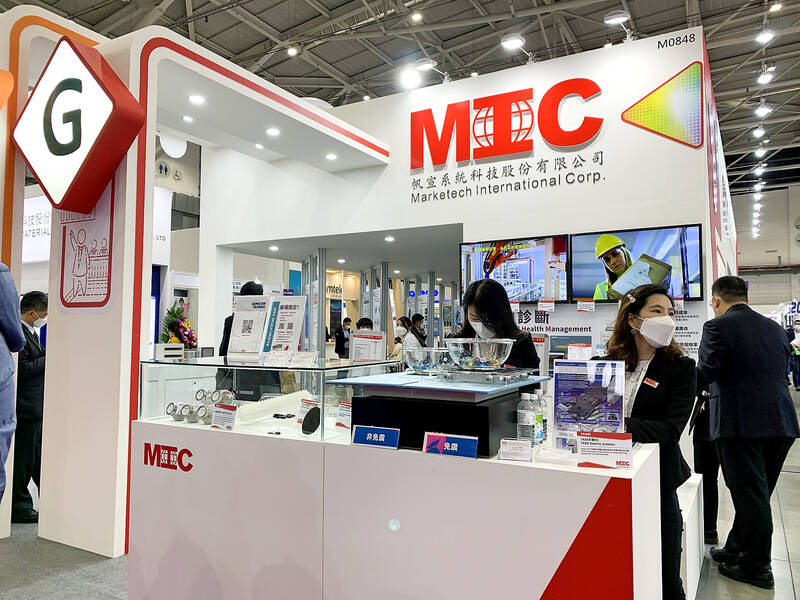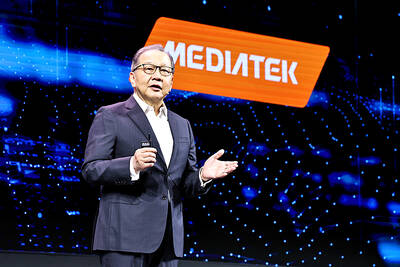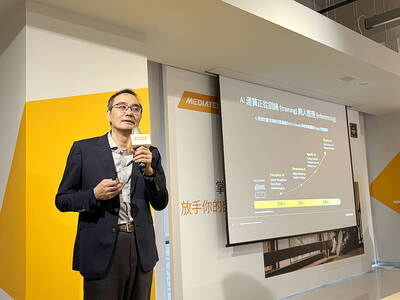Marketech International Corp (帆宣), a semiconductor and display panel equipment supplier and distributor, yesterday said it is to launch a subsidiary in Dresden, Germany, as its major customer, Taiwan Semiconductor Manufacturing Co (TSMC, 台積電) last month announced it is building its first European fab in the area.
TSMC is constructing a 12-inch wafer fab in Dresden to produce mainly car chips. The world’s largest contract chipmaker plans to build three advanced fabs in Arizona and two in Kumamoto, Japan.
Marketech has set up US and Japan subsidiaries to provide services to TSMC in those countries. It also set up an office in the Czech Republic last year to collect information about the local investment environment.

Photo: Grace Hung, Taipei Time
Marketech plans to hire about 125 employees in Europe — about half the size of its US subsidiary, company president Scott Lin (林育業) said yesterday.
The US subsidiary remains in the red due to higher labor costs, he said.
The company has slowed down the construction of a new factory in Tainan due to weaker-than-expected demand from display panel customers, he said.
Lin added that the company expects the NT$1.9 billion (US$59.2 million) Tainan factory would become operational in the second quarter of next year.
Marketech’s revenue in the first seven months of the year grew 10.42 percent annually to NT$34.92 billion.
The company expects revenue and net profit to show moderate growth in the second half of the year, Lin said.
However, the company projects more marked growth in revenue and profit next year, given an expected more solid recovery in the semiconductor industry and the contribution of the new product lineup, he said.
Marketech is planning to tap into the advanced packaging industry by supplying chip-on-wafer-on-substrate (CoWoS) equipment, he said.
It is collaborating with a Japanese company to offer CoWoS equipment from next year, he added.

CHIP HANG-UP: Surging memorychip prices would deal a blow to smartphone sales this year, potentially hindering one of MediaTek’s biggest sources of revenue MediaTek Inc (聯發科), the world’s biggest smartphone chip designer, yesterday said its new artificial intelligence (AI) chips used in data centers are to account for 20 percent of its total revenue next year, as cloud service providers race to deploy AI infrastructure to meet voracious demand. MediaTek is believed to be developing tensor processing units for Google, which are used in AI applications. While it did not confirm such reports, MediaTek said its new application-specific IC (ASIC) business would be a new growth engine for the company. It again hiked its forecast for the addressable ASIC market to US$70 billion by 2028, compared

Motorists ride past a mural along a street in Varanasi, India, yesterday.

MediaTek Inc (聯發科), the world’s biggest smartphone chip supplier, yesterday said it plans to double investment in data center-related technologies, including advanced packaging and high-speed interconnect technologies, to broaden the new business’ customer and service portfolios. The chip designer is redirecting its resources to data centers, mainly designing application-specific integrated circuits (ASIC) with artificial intelligence (AI) capabilities for cloud service providers. The data center business is forecast to lead growth in the next three years and become the company’s second-biggest revenue source, replacing chips used in smart devices, MediaTek president Joe Chen (陳冠州) told a media event in Taipei. “Three or four years

Until US President Donald Trump’s return a year ago, when the EU talked about cutting economic dependency on foreign powers — it was understood to mean China, but now Brussels has US tech in its sights. As Trump ramps up his threats — from strong-arming Europe on trade to pushing to seize Greenland — concern has grown that the unpredictable leader could, should he so wish, plunge the bloc into digital darkness. Since Trump’s Greenland climbdown, top officials have stepped up warnings that the EU is dangerously exposed to geopolitical shocks and must work toward strategic independence — in defense, energy and